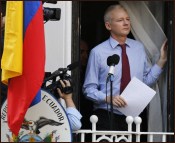Redefining Rape
 It was all so theatrical: the small balcony, the symbol of the Ecuadorian embassy affixed to the railing, the gold, blue and red of the Ecuadorian flag. Julian Assange, neatly dressed in a blue shirt and maroon tie, stepped out and spoke to his adoring fans.
It was all so theatrical: the small balcony, the symbol of the Ecuadorian embassy affixed to the railing, the gold, blue and red of the Ecuadorian flag. Julian Assange, neatly dressed in a blue shirt and maroon tie, stepped out and spoke to his adoring fans.
I suppose the tableau would have been more to his liking if the balcony was set at a much more commanding height: it’s not much higher than street level. Assange’s admirers did not constitute a massive throng. As he emerged, heroic music didn’t rise, Assange did not burst into a revised version of “Don’t Cry for Me, Argentina” which paid homage to the land which had given him refuge. Rather, he droned on about how Wikileaks is being persecuted by the United States government. While it’s certainly true that the American government is going after Wikileaks, Assange is so damaged as a spokesperson for the cause that an observer could be forgiven for thinking that he was talking about himself. He seems more than capable of making the megalomaniac’s error of thinking the cause is himself and he himself is the cause. Presumably, so as not to come across as nothing more than a malignant narcissist, he made mention of Bradley Manning, the former soldier who gave information to Wikileaks and has suffered terrible privations as a result. So as to diminish the perception that he is Vladimir Putin’s puppet, an impression which began the moment he accepted money from the state owned television channel “Russia Today”, he made mention of the now-imprisoned Russian punk rock band Pussy Riot. Then, mercifully, he stopped. Assange disappeared back into the confines of his Ecuadorian bedsit, presumably to remain for the foreseeable future.
According to the Independent newspaper, the Ecuadorian embassy consists of only ten rooms on the first floor. Assange has been granted a small office which has been converted into a bedroom. He’s also been given an internet connection, bathroom and access to a kitchenette. The British Government will not offer him safe passage; Ecuador won’t let Assange be arrested. Thus he remains at liberty, but not really: he is free to wander the ten rooms. His supporters pay him visits; one brought him a chocolate cake. He can witness the occasional Ecuadorian citizen coming into the embassy to get a passport renewed. He can talk on the internet; though one of the conditions of his asylum offer is that he refrains from political activity. He can look out the window and watch London’s life go on. The more he lingers, the longer that life will go on without him. If he persists in his confinement, perhaps he will experience that which he seems to fear the most: obscurity. Indeed, if he stays, he may become a curiosity, a strange relic passed from one Ecuadorian ambassador to the next; there is a precedent, during the Cold War, a Hungarian dissident remained in the United States embassy in Budapest for 15 years. Perhaps Assange knows he may be forgotten. Perhaps once he senses that he is no longer the centre of attention, that will be the moment he chooses to emerge. We’ll see.
Assange, despite what he and his supporters think, is not important. Due process is what is vital: in this case, it has been applied up until the point Assange skipped bail. Sweden went through careful deliberation before issuing an international arrest warrant. Britain granted him every chance of appeal; all were denied, and for good reason. The concept of rape and the inviolable principle of consent were under attack.
Strangely, ugly truths seem to emerge in bunches. The truth about the vileness of institutionalised racism emerged in the 1950’s in both the United States and in apartheid South Africa. The failure of the markets in 2007 was a worldwide occurance. Assange’s case has been followed closely on by two distinct incidents which are just as disturbing.
 In America, Representative Todd Akin of Missouri, a Republican candidate for the Senate, gave an interview in which he stated that pregnancy due to personal violation was rare due to biological defences which engage when “legitimate rape” occurs. This is a particularly unscientific position for an individual who sits on the House Science and Technology Committee to take. It was also no mere gaffe: Akin co-sponsored a bill in 2011 which stopped funding for abortion except in cases of “forcible rape”. Despite being rebuked by Mitt Romney and much of the Republican establishment, Akin has refused to drop out of the race.
In America, Representative Todd Akin of Missouri, a Republican candidate for the Senate, gave an interview in which he stated that pregnancy due to personal violation was rare due to biological defences which engage when “legitimate rape” occurs. This is a particularly unscientific position for an individual who sits on the House Science and Technology Committee to take. It was also no mere gaffe: Akin co-sponsored a bill in 2011 which stopped funding for abortion except in cases of “forcible rape”. Despite being rebuked by Mitt Romney and much of the Republican establishment, Akin has refused to drop out of the race.
George Galloway, the publicity addicted MP for Bradford West, decided to pile more infamy on top of his excremental reputation. Yesterday, he told the New Statesman magazine that Assange wasn’t actually guilty of rape, but rather “bad sexual etiquette”. His comments indicate he is remarkably ignorant of British law: rape occurs when there is no consent. Reports state that Assange took advantage of a sleeping woman, he also did not put on a condom when it was demanded. He seems to have neither responded to nor cared about the wishes of the women in question. This constitutes rape under both British and Swedish law: the extradition proceedings in British courts confirmed this. Galloway appears content to make up his own regulations when it favours someone who opposes the United States.
Despite their disagreements on a variety of other issues, Galloway, Assange, Akin, are all of a kind: they seem to think that there is ambiguity around the subject of rape. There is not: without consent, it’s rape. This is the beginning, the middle and the end of the matter; there is no post-modern analysis to be made, no fiddling about with subjective criteria, no softening of the edges or blurring of the lines. If the women in question did not agree to sexual activity, they were violated. This is a crime, not just in reference to British, Swedish, American and even Ecuadorian law, but rather it is a transgression which violates the sanctity of the person. Our fundamental freedoms rest upon an assumption: you may not own another person, but you own yourself. You may give of yourself, but no one is entitled to take. To suggest that under certain circumstances that such “taking” is acceptable or less than a gross violation is to undermine this concept; it threatens liberty itself. It is no wonder that President Obama rushed to condemn Akin by stating clearly, “Rape is rape”; it is puzzling that British politicians have not responded similarly to Galloway’s comments nor been as forceful in dismissing Assange’s claims. Labour’s reticence is particularly inexplicable: they stand a good chance of reclaiming Bradford West if they go in for the kill.
To be sure, there are discussions to be had about the sexualisation of our culture, the complexity of which may make some politicians blanch. Assange looks like someone who worships at the altar of himself on a regular basis; this may have a more sinister dimension. He perhaps is so weak minded as to have had his sense of ethics ground down by a consumer ideology which tells him “because he’s worth it” and provides an abundance of sexualised images every time he turns on a music video. Because he lacks moral courage, he may have allowed himself to turn into a salivating predator who feels entitled to claim what he wants from the vulnerable, provided they show enough leg and cleavage. He may have been dazzled by a celebrity-focused media and succumbed to the belief that he exists at a rarefied height at which normal rules do not apply. All of this may have occured, but it doesn’t matter: just because one is incited in general does not mean that the specific is permissable. He is an adult and responsible for his actions. The plaintiffs in Sweden deserve to have their case heard, their rights respected, due process honoured. If Assange is found guilty, he should go to prison. To again quote President Obama, “rape is rape”, and it always has been. It cannot and should not be redefined.


